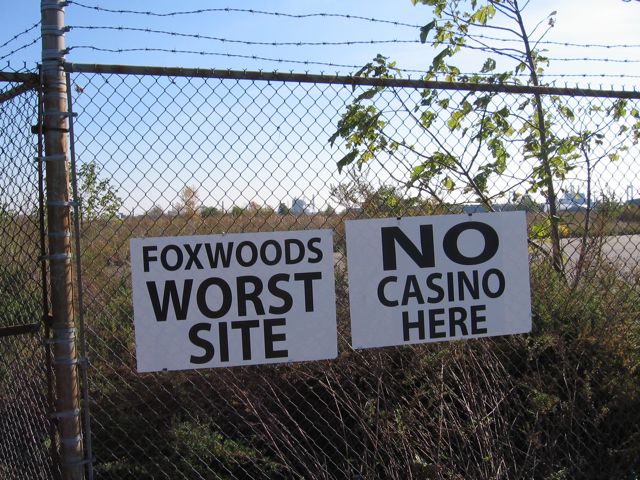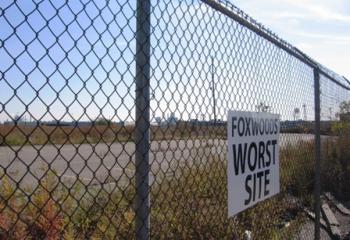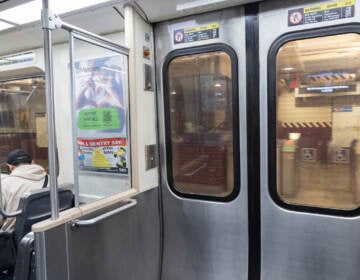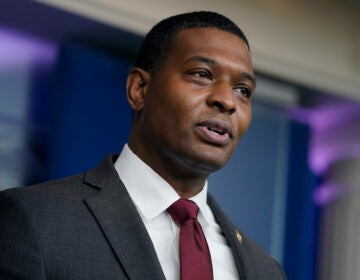State gaming board seeking applications for second Philadelphia casino license
The Pennsylvania Gaming Control Board Wednesday opened bidding for a second Philadelphia casino license, despite a legislative attempt to open bidding for the license to potential operators from across the state.
The announcement was cheered by some, including State Rep. Rosita Youngblood, D-Philadelphia, who said the city needs the tax revenue and the jobs a second casino would bring. Others, including members of Casino-Free Philadelphia and the national group Stop Predatory Gambling, vowed to fight a second casino as vehemently as they fought Foxwoods Casino, which never opened, and SugarHouse, which did and has expansion plans.
Current state law calls for two casinos in the city, and two licenses were awarded in 2006. SugarHouse opened on the Delaware Avenue riverfront in 2010, but Foxwoods never started construction. Citing frustration over repeated delays, the PGCB revoked Foxwoods’ license in December 2010. A court battle ensued, and concluded in March of this year, with the state’s decision being upheld.
Some Foxwoods opponents oppose casinos in general, and some did not like the proposed Columbus Ave. and Reed St. location due to traffic concerns or the feeling that that use and/or the kind of building Foxwoods proposed did not fit in with efforts to revitalize the waterfront. City leaders opposed the site as well.
Residents and some state elected officials who represent Philadelphia pushed for the second license to be killed, or taken out of Philadelphia. Meanwhile, elected officials from elsewhere said their jurisdictions would love the revenue and jobs a casino would bring. The State House passed a bill in May that would allow potential operators from across the state a chance at the license, granting it to the highest bidder.
The PGCB waited to see what the Senate would do, said spokesman Doug Harbach. But summer break came without action on a similar bill. “… Since it appears that the General Assembly will not approve such a change in the foreseeable future, the Board believes that it is in the best interest of the people of Pennsylvania to proceed with the application process,” PBCB Chairman William H. Ryan Jr. said. (To see video of the announcement, go to the PGCB website here and click on the July 11 video. Free software must be downloaded. You can click on the agenda item to forward the video.)
The gaming board will accept applications until Nov. 15. Then there will be at least one public hearing in Philadelphia, potentially more depending on the number and complexity of the proposals, Harbach said. In all, the vetting of the applications is expected to take nine to 12 months, he said. And if the past is any indication, applicants who were not selected are likely to appeal the board’s decision. “It could be a number of years before a second casino opens in Philadelphia,” he said.
While city leaders never liked the Foxwoods site – and for a time, even opposed SugarHouse – they now support a second Philadelphia casino. Some state-level leaders from Philadelphia do, too.
“The administration is very supportive of moving on with what has already been established (in state law),” said Deputy Mayor for Economic Development Alan Greenberger, who also is chairman of the planning commission. Part of that support comes from experience with SugarHouse. Greenberger said he knows “not everybody loves it,” but the city has established a good working relationship with the casino, and the casino has responded to design change requests, is managing traffic “in a reasonable way,” and has provided “remarkable public access” to the Delaware River.
In April, City Council President Darrell Clarke wrote an op-ed saying the city could use the money and jobs a second casino brought, and that the crime and other problems anti-casino activists predicted haven’t materialized. “For the largest payout, the wisest bet for the state’s next casino is right here,” he wrote in a piece that appeared in The Inquirer.
State Rep. Youngblood, said in a written statement that she hoped the PGCB’s announcement would put an end to both the controversy surrounding the previous attempts to build the second casino and the efforts of some of her colleagues in Harrisburg to open the application process, state-wide.
“The truth of the matter is Philadelphia has been counting on the revenue from this second Category 2 license since the original Gaming Act was established in 2004,” she said. “And, the people of this city have been eager to apply for the full-time, high-wage jobs, most of which come with medical and pension benefits, that were promised from two licensed facilities. This announcement puts to rest the uncertainty of where this casino should be built and once again provides Philadelphia with an opportunity to infuse our communities with significant economic development funding and thousands of good paying jobs.”
But other state legislators and anti-casino activists say the opening of this application process is most definitely not the end of the location discussion. And the gaming commission’s Harbach said they may be right.
If the Senate joined the house in passing legislation that opened up the license process state-wide when it returns in the fall, the PGCB would have to adjust its plan, Harbach said.
The state-wide proposal allows applications from Philadelphia, but depending what language is passed by both houses, any applicants who submitted by then might have to make changes to their proposals, Harbach said. For example, the legislation already passed by the House calls for an auction-like process that would change the application procedure considerably. And with the additional licensing cost, and state-wide competition, some applicants might reconsider applying at all, Harbach said.
Local State Rep. Mike O’Brien, one of the co-sponsors of the House bill to open a commonwealth-wide bidding process for the remaining license, believes there are too many casinos clustered in Greater Philadelphia already. The saturation means that a new casino would take from the profits of those existing ones, said O’Brien spokeswoman Mary Isaacson. “Everybody has to remember, the Gaming Act calls for what is most beneficial for the Commonwealth” as a whole, Isaacson said.
State Sen. John Wozniak, D-Johnstown, said he was disappointed, but not surprised, by the gaming board’s action. Wozniak said there wasn’t enough consensus to get legislation through the senate this time around, with some senators wanting to simply kill the license altogether. Those who want to kill the license are mostly from places that already have a casino, and seem to have the attitude, “I already got mine, the heck with anybody else,” he said.
Wozniak plans to introduce new legislation, aimed at opening the application process state-wide, in the fall, leaving it up to the industry experts to determine where the best location is.
He would love a casino in his district. He also thinks Greater Philadelphia is saturated, and beyond that, that opposition from the community will prevent an casino from being built here.
“I watched (Foxwoods) go through its agony,” he said. “I think we’re just going to see another five years of agony, and nothing’s going to happen there except some lawyers are going to make a lot of money.”
Dan Hajdo, of Casino Free Philadelphia, and Paul Boni, a Philadelphian who is a board member of the national group Stop Predatory Gambling, say their organizations will do everything they can to stop a second Philadelphia casino. Both organizations say they oppose casinos because they lead to gambling addiction and other social problems.
“For the state to be promoting a highly addictive product within close proximity of residential areas is unconscionable,” Boni said.
It wasn’t long ago that Foxwoods was supposed to be a done deal, and this isn’t any more done than that turned out to be. If any lawmaker says it’s now too late to cancel the license, they would be incorrect. There is plenty of time to change the law,” he said.
Hajdo said he’s been expecting an announcement like this ever since Philadelphia developer Bart Blatstein, the man behind The Piazza at Schmidts and other developments, announced his hopes of including a casino in a development he plans for the former Philadelphia Inquirer building at 400 N. Broad Street.
He said his organization will apply pressure to lawmakers, both to keep this casino from opening and to make casinos change their practices around free alcohol and other practices.
Rosanne Loesch, a former Society Hill Civic Association board member who fought Foxwoods, said that fight forged bonds between different neighborhoods that have allowed them to work more cohesively together on other issues ever since. Those proposing a casino will find a more knowledgeable and mobilized citizenry, she said. “They are going to have their hands full.”
Many of those community organizations are along the Central Delaware Waterfront (although Chinatown was heavily involved, since one incarnation of Foxwood’s plan called for locating the casino at The Gallery). Those that are have representatives on the Central Delaware Advocacy Group, which advocates for the city’s long-term vision for the waterfront.
While individual civics objected to a waterfront location, “CDAG has never taken an official position for or against casinos,” Chairman Matt Ruben said. “However, I think it’s fair to say that the Master Plan process has shown pretty clearly that the Foxwoods site was not a good idea for the waterfront. And I think that most people all along the waterfront areas would agree that a second casino on the waterfront would be a terrible idea.”
Location matters hugely to the city, Greenberger said. “Obviously, the siting is a very important thing. And we have a very strong interest in that. We’ve said to gaming board that we’d like to work more closely with them in order to do a deeper and better analysis of potential site and the potential impacts.”
Any applicant choosing the Foxwoods site would have a difficult time convincing the city it was a good place for a casino, he said. “There were a lot of questions that had been raised about the Foxwoods site, regarding traffic and access, that never had answers,” he said. “If somebody came back and proposed another casino on that site, the questions all still exist without answers,” he said. “It would be a pretty high bar to get over.”
But Greenberger is not ruling out any waterfront site. “We’d be amenible, but it depends where it is, and how it could get organized within the broader plan for waterfront,” he said. “That’s a lot of ifs.”
The city has asked the gaming board to allow city representatives to help them sort through the applications, so the city has a say on the location, Greenberger said. “Impact on the neighborhood is critical,” he said. The city would look at access and the ability to deal with the vehicles that would come to the site, the size of the site and the capacity for growth there, and leveraging potential – would a casino in a certain area foster improvements to the public realm and/or additional economic development.
Greenberger said the city has no favorite potential casino sites at the moment, and won’t until applications come in. “Bart Blatstein is going around with an interesting proposal, but we’re going to reserve comments on it, or any other, until we get a better sense of the universe of sites out there.”
For anyone planning to pursue the second license: Greenberger hopes applicants will share their ideas with the city for feedback even before making official application to the state.
When asked if the PGCB has received inquiries from any potential applicants, Harbach said the board would not reveal such information until after the application process is closed.
SugarHouse representatives declined to comment on the state’s decision to seek an operator for a second Philadelphia casino.
Reach the reporter at kgates@planphilly.com
WHYY is your source for fact-based, in-depth journalism and information. As a nonprofit organization, we rely on financial support from readers like you. Please give today.








